Monday Feb 23, 2026
Monday Feb 23, 2026
Thursday, 12 November 2015 00:00 - - {{hitsCtrl.values.hits}}
 Pakistan Commerce Minister Khurram Dastgir Khan – Pic by Lasantha Kumara
Pakistan Commerce Minister Khurram Dastgir Khan – Pic by Lasantha Kumara
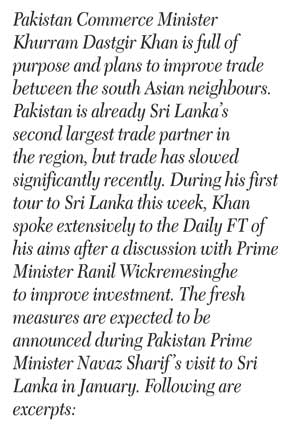 By Uditha Jayasinghe
By Uditha Jayasinghe
![]() : What were the steps taken to improve bilateral trade during your visit?
: What were the steps taken to improve bilateral trade during your visit?
![]() : We started discussing it when President Maithripala Sirisena was in Islamabad earlier this year stemming from the agreement that the FTA between Pakistan and Sri Lanka was for us the first we did with any nation. But now it’s 10 years old and has now reached what we call in economic terms, the point of diminishing returns. The gains that could have been realised have been realised but it has now reached a stable state. Not much growth is evident, patterns are well-established, so given our very close political friendship between the two nations and I’m happy to note between two democracies, the logical next step was what we call a widening and deepening of our trade relationship, which would in effect call, for the lack of a better term, FTA2. Essential this would mean accepting the gains that have already been made but increasing market access, the items under duty free and quota free access.
: We started discussing it when President Maithripala Sirisena was in Islamabad earlier this year stemming from the agreement that the FTA between Pakistan and Sri Lanka was for us the first we did with any nation. But now it’s 10 years old and has now reached what we call in economic terms, the point of diminishing returns. The gains that could have been realised have been realised but it has now reached a stable state. Not much growth is evident, patterns are well-established, so given our very close political friendship between the two nations and I’m happy to note between two democracies, the logical next step was what we call a widening and deepening of our trade relationship, which would in effect call, for the lack of a better term, FTA2. Essential this would mean accepting the gains that have already been made but increasing market access, the items under duty free and quota free access.
![]() : Have you identified the scope FTA2 would encompass?
: Have you identified the scope FTA2 would encompass?
![]() : We have done some work but our teams will sit down when the formal decision is made to begin the talks, which we hope will be made when Prime Minister Nawaz Sharif is in Colombo in January. The areas of interest are very clear. First of all it would be to encourage joint ventures in agro-food processing, pharmaceuticals, consumer goods, particularly attracting Pakistani investment in sugar and cement.
: We have done some work but our teams will sit down when the formal decision is made to begin the talks, which we hope will be made when Prime Minister Nawaz Sharif is in Colombo in January. The areas of interest are very clear. First of all it would be to encourage joint ventures in agro-food processing, pharmaceuticals, consumer goods, particularly attracting Pakistani investment in sugar and cement.
![]() : Sri Lanka and India have been working to widen trade relations with a Comprehensive Economic Partnership Agreement (CEPA) but it has stalled for several years. Moving forward to put FTA2 in place, do you feel delays are a concern?
: Sri Lanka and India have been working to widen trade relations with a Comprehensive Economic Partnership Agreement (CEPA) but it has stalled for several years. Moving forward to put FTA2 in place, do you feel delays are a concern?
![]() : No. This is precisely why we are not calling it a CEPA, which could take ages to negotiate. Our aim is to restrict FTA2, for the time being, to goods and also to by mutual agreement start to bring down non-tariff barriers, including the civil servant procedures
: No. This is precisely why we are not calling it a CEPA, which could take ages to negotiate. Our aim is to restrict FTA2, for the time being, to goods and also to by mutual agreement start to bring down non-tariff barriers, including the civil servant procedures 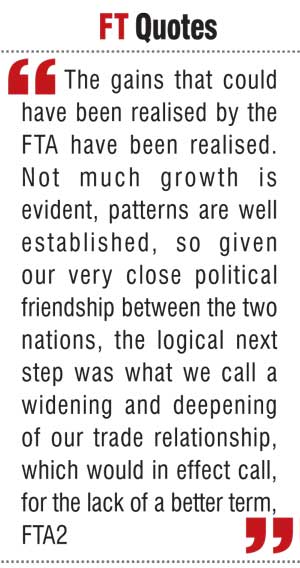 that often scuttle investments. We’ve had one major case where a Pakistani company was to build a cement plant in Sri Lanka and almost all the work was done when at the very last minute environmental concerns were raised and the cost of that was so prohibitive that the whole project had to be scuttled. We’re now hoping that by mutual understanding, without going through the rigmarole of a comprehensive agreement on investment, the understanding is that we facilitate each other’s investments. Of course increase the list of items, which we will open for each other.
that often scuttle investments. We’ve had one major case where a Pakistani company was to build a cement plant in Sri Lanka and almost all the work was done when at the very last minute environmental concerns were raised and the cost of that was so prohibitive that the whole project had to be scuttled. We’re now hoping that by mutual understanding, without going through the rigmarole of a comprehensive agreement on investment, the understanding is that we facilitate each other’s investments. Of course increase the list of items, which we will open for each other.
![]() : Other than Joint Working Groups, analysts have pointed out the need to have individuals to iron out trade issues related to the FTA. Would this be a model that you have focused on during your discussions?
: Other than Joint Working Groups, analysts have pointed out the need to have individuals to iron out trade issues related to the FTA. Would this be a model that you have focused on during your discussions?
![]() : Yes I have spoken of this with Prime Minister Ranil Wickremesinghe and what we have formally proposed is to begin with each Commerce Ministry having one focal person who can deal with issues arising out of the FTA, including confusions, delays, interpretations of statute; the appointed person will be responsible. This also involves intense liaison with customers so there is the necessity of having someone. Eventually we can have a framework but we will begin with focal persons; here again instead of negotiating for a long time to clear the structure we start designating a person now because there is a certain urgency to deepen our economic relationship created by mega regional agreements like the Trans-Pacific Partnership (TPP) and for Pakistan and Sri Lanka to be prepared for it, not to be left out of world markets and by cementing our relationship further and better prepared to deal with the agreements that are happening around us in the region.
: Yes I have spoken of this with Prime Minister Ranil Wickremesinghe and what we have formally proposed is to begin with each Commerce Ministry having one focal person who can deal with issues arising out of the FTA, including confusions, delays, interpretations of statute; the appointed person will be responsible. This also involves intense liaison with customers so there is the necessity of having someone. Eventually we can have a framework but we will begin with focal persons; here again instead of negotiating for a long time to clear the structure we start designating a person now because there is a certain urgency to deepen our economic relationship created by mega regional agreements like the Trans-Pacific Partnership (TPP) and for Pakistan and Sri Lanka to be prepared for it, not to be left out of world markets and by cementing our relationship further and better prepared to deal with the agreements that are happening around us in the region.
![]() : Most SMEs have little knowledge of opportunities available by the FTA and thereby have limited access. How do you plan to improve awareness?
: Most SMEs have little knowledge of opportunities available by the FTA and thereby have limited access. How do you plan to improve awareness?
![]() : I think this is another thing we can both agree to do within our respective countries. For example, starting to translate all documents to local languages so SMEs would have direct access to this information and the opportunities that are on offer under the FTA. Information has to be disseminated more efficiently, we have to talk to chambers, trade associations, and tell them of the opportunities available. This definitely is part of the agenda. I think one of the indications that the current FTA reached a plateau was some of the better organised companies knew which niches to exploit but the word didn’t go out widely enough. Both countries have the peaceful environment to purse the path of mutual economic prosperity.
: I think this is another thing we can both agree to do within our respective countries. For example, starting to translate all documents to local languages so SMEs would have direct access to this information and the opportunities that are on offer under the FTA. Information has to be disseminated more efficiently, we have to talk to chambers, trade associations, and tell them of the opportunities available. This definitely is part of the agenda. I think one of the indications that the current FTA reached a plateau was some of the better organised companies knew which niches to exploit but the word didn’t go out widely enough. Both countries have the peaceful environment to purse the path of mutual economic prosperity. 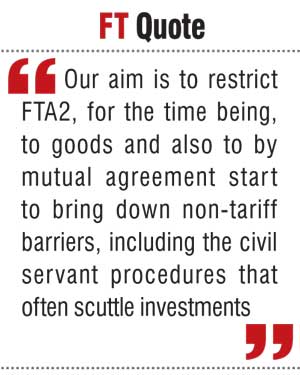
![]() : Another frequently raised issue is visa access. Will steps be taken to resolve this?
: Another frequently raised issue is visa access. Will steps be taken to resolve this?
![]() : Visas are an issue. Both in terms of trade and visas, we are developing an understanding, which we hope will be taken further when Prime Minister Sharif is here in Colombo. While we want to participate and expedite the South Asia Association for Regional Cooperation (SAARC) process, we should not be bound by them and we should conclude our bilateral understanding at the earliest, including a fast-tracked visa process. So our effort would be for both countries to mutually agree, particularly on the procedures to issue visas to business people, and have an arrangement through which a person gets a six-month visa and if their conduct is acceptable then start issuing multiple-entry visas. This is very much a key building block of this relationship because for it to flourish businessmen from both countries need to meet each other frequently and without much hassle.
: Visas are an issue. Both in terms of trade and visas, we are developing an understanding, which we hope will be taken further when Prime Minister Sharif is here in Colombo. While we want to participate and expedite the South Asia Association for Regional Cooperation (SAARC) process, we should not be bound by them and we should conclude our bilateral understanding at the earliest, including a fast-tracked visa process. So our effort would be for both countries to mutually agree, particularly on the procedures to issue visas to business people, and have an arrangement through which a person gets a six-month visa and if their conduct is acceptable then start issuing multiple-entry visas. This is very much a key building block of this relationship because for it to flourish businessmen from both countries need to meet each other frequently and without much hassle.
![]() : As you mentioned regional trade partnerships are growing, so how can countries shift focus back to bilateral agreements?
: As you mentioned regional trade partnerships are growing, so how can countries shift focus back to bilateral agreements?
![]() : The South Asia Free Trade Agreement (SAFTA) has facilitated trade in many areas but as I said the time factor is constraining us into concluding our mutual understanding sooner rather than later. We would like to do that since we have a FTA to build a facilitative framework around our FTA.
: The South Asia Free Trade Agreement (SAFTA) has facilitated trade in many areas but as I said the time factor is constraining us into concluding our mutual understanding sooner rather than later. We would like to do that since we have a FTA to build a facilitative framework around our FTA. 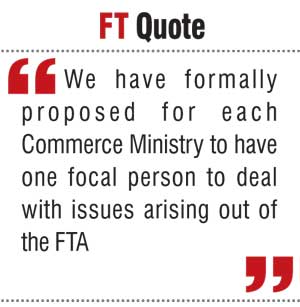
![]() : A point frequently raised by Pakistani businessmen is Sri Lanka’s complicated land laws where foreign ownership is restricted. Do you feel this is an impediment to joint ventures and other investment?
: A point frequently raised by Pakistani businessmen is Sri Lanka’s complicated land laws where foreign ownership is restricted. Do you feel this is an impediment to joint ventures and other investment?
![]() : I wouldn’t particularly point out the land laws but overall there has been concern. But we need to have a sort of rule book or a checklist; if an investor has fulfilled the checklist that should be the end of the cost that can be imposed on them. What discourages them, I think, is they thought they have one rule book, they fulfilled that but when they go on the ground certain new charges creep up, which of course would be better if they were included in the original cost. For example, we want to protect the environment but that cost should be built into that rule book not be imposed when the feasibility has been worked out. I think predictability is important for trade. I don’t claim we have solved this issue in Pakistan; there is an issue there as well. But as I said ultimately it is important to support and learn from each other. Agree upon a rule book that both can follow. All the investor costs should be declared upfront with the understanding that no further costs will be imposed so companies can make the calculation and as we hope start investing.
: I wouldn’t particularly point out the land laws but overall there has been concern. But we need to have a sort of rule book or a checklist; if an investor has fulfilled the checklist that should be the end of the cost that can be imposed on them. What discourages them, I think, is they thought they have one rule book, they fulfilled that but when they go on the ground certain new charges creep up, which of course would be better if they were included in the original cost. For example, we want to protect the environment but that cost should be built into that rule book not be imposed when the feasibility has been worked out. I think predictability is important for trade. I don’t claim we have solved this issue in Pakistan; there is an issue there as well. But as I said ultimately it is important to support and learn from each other. Agree upon a rule book that both can follow. All the investor costs should be declared upfront with the understanding that no further costs will be imposed so companies can make the calculation and as we hope start investing.
![]() : Do you feel corruption is an issue for investors?
: Do you feel corruption is an issue for investors?
![]() : I think the milieu in which both countries currently operate is broadly the same so it’s not an issue. Our business people should not feel too different in Sri Lanka. Sri Lankan businessmen should not feel too different in Pakistan. I think this is one of the reasons we should be comfortable doing business in each other’s countries.
: I think the milieu in which both countries currently operate is broadly the same so it’s not an issue. Our business people should not feel too different in Sri Lanka. Sri Lankan businessmen should not feel too different in Pakistan. I think this is one of the reasons we should be comfortable doing business in each other’s countries.
![]() : Do you have a timeline or targets for your ambitious growth plans?
: Do you have a timeline or targets for your ambitious growth plans?
![]() : Targets will probably be declared when Prime Minister Sharif comes to Sri Lanka and as I said we would rather do this very, very quickly. Because you see in the regional situation and the current tension between Pakistan and India, Sri Lanka is one regional partner and longstanding friend and in our quest for trade liberalisation and opening up our economy Sri Lanka is very much a high priority country.
: Targets will probably be declared when Prime Minister Sharif comes to Sri Lanka and as I said we would rather do this very, very quickly. Because you see in the regional situation and the current tension between Pakistan and India, Sri Lanka is one regional partner and longstanding friend and in our quest for trade liberalisation and opening up our economy Sri Lanka is very much a high priority country. 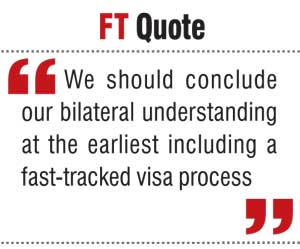
![]() : Are there plans to improve tourism between Sri Lanka and Pakistan?
: Are there plans to improve tourism between Sri Lanka and Pakistan?
![]() : We do want to encourage religious tourism to Pakistan. Pakistan has Takshila and so many of Sri Lankan citizens would like to visit so we are trying to formalise that. In the coming few months we will be sponsoring a few delegations and hopefully open a door through which the normal public can then pass through and visit holy sites in Pakistan. The flipside of this would be to promote Sri Lanka as a tourist destination for Pakistanis currently travelling to Malaysia or Turkey. One hurdle is the lack of air connectivity and that is also a topic of discussion, how to increase the number of flights between Pakistan and Sri Lanka.
: We do want to encourage religious tourism to Pakistan. Pakistan has Takshila and so many of Sri Lankan citizens would like to visit so we are trying to formalise that. In the coming few months we will be sponsoring a few delegations and hopefully open a door through which the normal public can then pass through and visit holy sites in Pakistan. The flipside of this would be to promote Sri Lanka as a tourist destination for Pakistanis currently travelling to Malaysia or Turkey. One hurdle is the lack of air connectivity and that is also a topic of discussion, how to increase the number of flights between Pakistan and Sri Lanka.
![]() : Given Premier Sharif’s imminent visit to Sri Lanka, how would you like to see relations between the two countries develop?
: Given Premier Sharif’s imminent visit to Sri Lanka, how would you like to see relations between the two countries develop?
![]() : Ours is a very broad relationship. Pakistan has been a profound supporter of Sri Lanka in recent history. Pakistan’s contribution to Sri Lanka is a good foundation for a long-term relationship. We should go forward as economic partners, as two nations which are committed to each other in friendship, which we already do but we would like to continue it, support each other at international diplomatic forums, and as has been the norm, come to each other’s aid in times of trouble.
: Ours is a very broad relationship. Pakistan has been a profound supporter of Sri Lanka in recent history. Pakistan’s contribution to Sri Lanka is a good foundation for a long-term relationship. We should go forward as economic partners, as two nations which are committed to each other in friendship, which we already do but we would like to continue it, support each other at international diplomatic forums, and as has been the norm, come to each other’s aid in times of trouble.
![]() : What other tasks are you involved in during your visit?
: What other tasks are you involved in during your visit?
![]() : Accompanying me is a delegation of leading Pakistani businessmen so once initial discussions are concluded we will hold a business forum; we will have delegation level talks with the Sri Lankan Commerce Minister. The businessmen visited an industrial park and we will hear their impressions and assessments of what in the private sector’s view are the areas which would be high priority and see what areas to take forward to revive the Joint Working Groups and push them to working quickly so we will have tangible and substantive announcements to be made when the Prime Minister arrives in Sri Lanka. We will also discuss the frequency of our meetings, perhaps security can be every six months and ministers can meet every so often. There will also be follow-ups. So it will be more focused on detail and brass tacks. We will get down to business, literally.
: Accompanying me is a delegation of leading Pakistani businessmen so once initial discussions are concluded we will hold a business forum; we will have delegation level talks with the Sri Lankan Commerce Minister. The businessmen visited an industrial park and we will hear their impressions and assessments of what in the private sector’s view are the areas which would be high priority and see what areas to take forward to revive the Joint Working Groups and push them to working quickly so we will have tangible and substantive announcements to be made when the Prime Minister arrives in Sri Lanka. We will also discuss the frequency of our meetings, perhaps security can be every six months and ministers can meet every so often. There will also be follow-ups. So it will be more focused on detail and brass tacks. We will get down to business, literally.